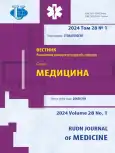Impact of three types of music on patients during dental implant surgery and wisdom tooth extractions
- Авторлар: Dagher S.1, Dymnikov A.B.1
-
Мекемелер:
- RUDN University
- Шығарылым: Том 28, № 1 (2024): DENTISTRY
- Беттер: 68-75
- Бөлім: Stomatology
- URL: https://journal-vniispk.ru/2313-0245/article/view/319773
- DOI: https://doi.org/10.22363/2313-0245-2024-28-1-68-75
- EDN: https://elibrary.ru/UWUXEC
- ID: 319773
Дәйексөз келтіру
Толық мәтін
Аннотация
Relevance. Many patients suffer from anxiety when planning a surgical procedure, which leads them to either postpone it or go through it with all those negative feelings that may affect the course of the surgical work or even its outcomes. Modern medicine aims to find non-pharmaceutical ways, such as music, to put these emotions under control so that the patient feels a sense of calm and tranquility throughout the surgical operation and comes out with less negative feelings and good memories, which prevents the formation of any psychological trauma. Our investigation aims to study the effect of three types of music, on the psychological state of the patient during surgery, by evaluating the data of systolic and diastolic pressure, pulse, and oxygen level in the blood. Materials and Methods . 36 patients who visited the Medical Center of the RUDN University on a daily basis for dental implants and wisdom tooth extractions were randomly selected to undergo the experiment. They were divided into four groups, the first was the control group which was not exposed to music, the second was exposed to classical music, the third was exposed to Buddhism music, and the fourth was exposed to music generated by Artificial Intelligence. Pressure, pulse, and oxygen level were recorded in three phases and changes assessed using Student’s t-test and Mann-Whitney U analyses. Results and Discussion. The final results obtained did not show any significant changes in the values of pressure, pulse, and blood oxygenation during the period of exposure to music when compared with control group. Conclusion. Exposing to music didn’t show any positive effect on stress levels during dental implantation and extraction.
Негізгі сөздер
Авторлар туралы
Suzan Dagher
RUDN University
Email: suzandager@yandex.com
ORCID iD: 0009-0004-1950-4011
Moscow, Russian Federation
Alexander Dymnikov
RUDN University
Хат алмасуға жауапты Автор.
Email: suzandager@yandex.com
ORCID iD: 0000-0001-8980-6235
SPIN-код: 7254-4306
Moscow, Russian Federation
Әдебиет тізімі
- Jenkins J.S. The Mozart effect. Journal of the royal society of medicine. 2001;94:170-172. doi: 10.1177/014107680109400404.
- Domante Kucikiene, Ruta Praninskiene. The impact of music on the bioelectrical oscillations of the brain. ACTA medical lituanica. 2018;25(2):101-106. doi: 10.6001/actamedica.v25i2.3763
- Schienle A, Scharmüller W, Leutgeb V, Schäfer A, Stark R. Sex differences in the functional and structural neuroanatomy of dental phobia. Brain Struct Funct. 2013;218:779-787. doi: 10.1007/s00429-012-0428-z
- Misra S, Shastri I. Rumination of Music on Buddhism and Hinduism. International Journal of Human Movement and Sports Science. 2014;2(3):33-40. doi: 10.13189/saj.2014.020301
- Jaušovec N, Jaušovec K, Gerlič I. The influence of Mozart’s music on brain activity in the process of learning. Clinical neurophysiology. 2006;117(12):2703-2714. doi: 10.1016/j.clinph.2006.08.010
- Civit M, Civit-Masot J, Cuadrado F, Escalona MJ. A systematic review of artificial intelligence-based music generation: Scope, applications, and future trends. Expert Systems with Applications. 2022;118190. doi: https://doi.org/10.1016/j.eswa.2022.118190
- Ragot M, Martin N, Cojean S. Ai-generated vs. human artworks. a perception bias towards artificial intelligence? InExtended abstracts of the 2020 CHI conference on human factors in computing systems. 2020;25:1-10. doi: 10.1145/3334480.3382892
- Gulnahar Y, Kupeli I. Effect of Different Kinds of Music on Anxiety During Implant Surgery in Turkey: Randomized Controlled Study. International Journal of Oral & Maxillofacial Implants. 2020;35(4). doi: 10.11607/jomi.8329
- Maulina T, Djustiana N, Shahib MN. The effect of music intervention on dental anxiety during dental extraction procedure. Open Dent J. 2017;11:565-572. doi: 10.2174/1874210601711010565
- Fachner J, Gold C, Erkkilä J. Music therapy modulates fronto-temporal activity in rest-EEG in depressed clients. Brain Topogr. 2013;26(2):338-354. doi: 10.1007/s10548-012-0254-x
- Wright H. The correlation of classical, jazz, and pop music to a reduction of dental anxiety experienced by adult patients. Undergraduate Honors Thesis Collection. 2018:437.
- Wong H, Lopez-Nahas V, Molassiotis A. Effects of music therapy on anxiety in ventilator-dependent patients. Heart Lung. 2001;30:376-387. doi: https://doi.org/10.1067/mhl.2001.118302
- Nidich SI, Rainforth MV, Haaga DA, Hagelin J, Salerno JW, Travis F, Tanner M, Gaylord-King C, Grosswald S, Schneider RH. A randomized controlled trial on effects of the Transcendental Meditation program on blood pressure, psychological distress, and coping in young adults. American journal of hypertension. 2009;22(12):1326-1331. doi: 10.1038/ajh.2009.184
Қосымша файлдар









